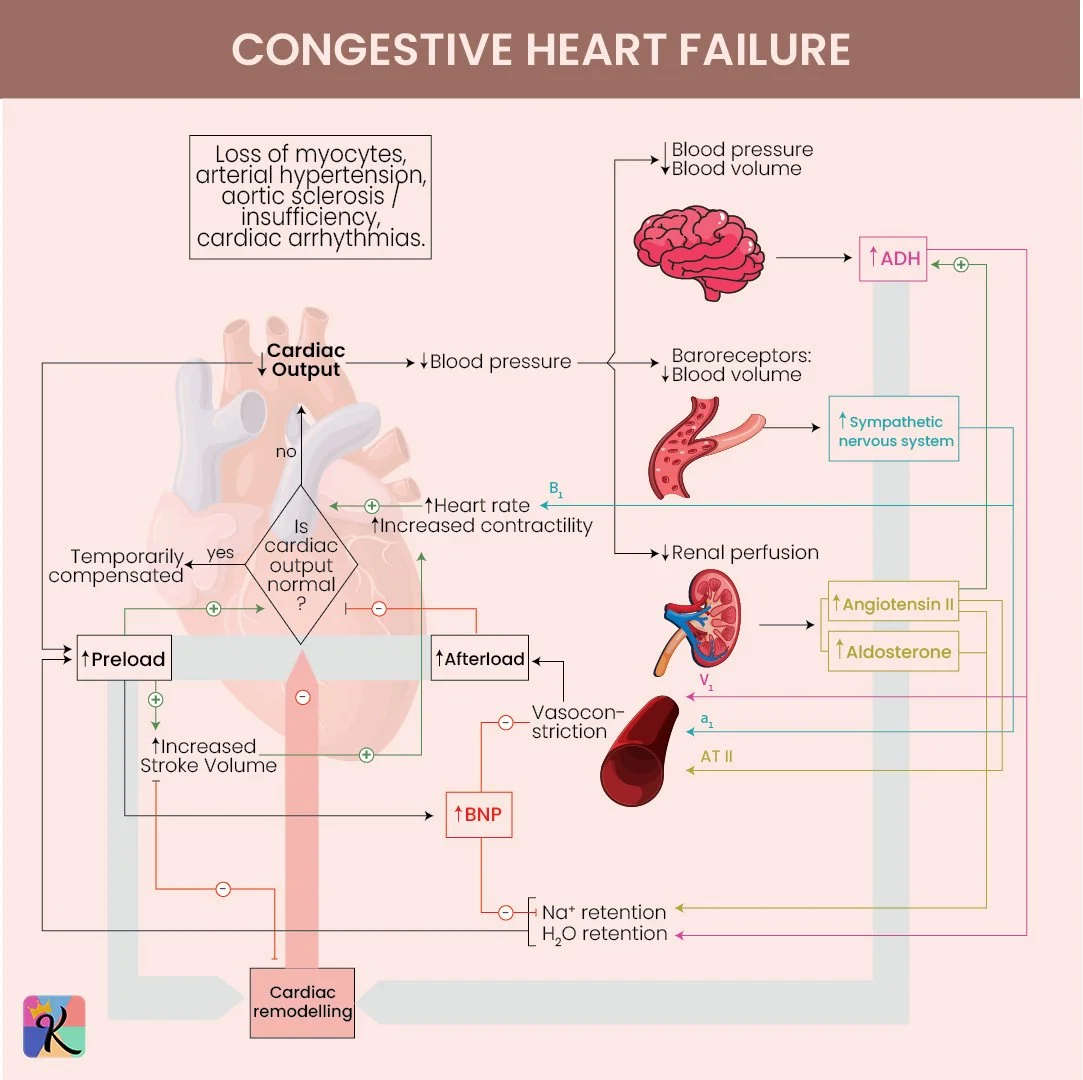Understanding Congestive Heart Failure (CHF) – Diagnosis & Management
Congestive Heart Failure (CHF) is a common yet serious cardiovascular condition where the heart fails to pump blood effectively, leading to fluid buildup in the lungs and extremities. CHF is a high-yield topic for the USMLE Step 1 and Step 2, requiring a solid understanding of pathophysiology, diagnosis, and treatment options.
In this guide, we break down CHF’s clinical presentation, diagnostic approach, and management strategies to help you ace your exams!
Pathophysiology of CHF
CHF occurs when the heart's ability to pump blood is compromised, leading to two main types:
Systolic Heart Failure (HFrEF) → Reduced Ejection Fraction (EF < 40%) due to weakened contractility.
Diastolic Heart Failure (HFpEF) → Preserved Ejection Fraction (EF ≥ 50%) due to stiff ventricles.
🔹 Key Causes of CHF:
HFrEF: Coronary artery disease (CAD), myocardial infarction (MI), dilated cardiomyopathy
HFpEF: Hypertension, left ventricular hypertrophy, restrictive cardiomyopathy
🚨 USMLE Tip: HFrEF is treated with medications that improve survival, while HFpEF management focuses on symptom relief.
Clinical Presentation of CHF
CHF symptoms vary based on the affected side of the heart:
| Type | Symptoms |
|---|---|
| Left-Sided CHF | Dyspnea, orthopnea, paroxysmal nocturnal dyspnea (PND), pulmonary edema |
| Right-Sided CHF | Peripheral edema, hepatomegaly, jugular venous distension (JVD), ascites |
🔹 USMLE Mnemonic: "DO PEE" for Left-Sided CHF
Dyspnea
Orthopnea
Pulmonary congestion
Exertional fatigue
Edema (Pulmonary)
Diagnostic Approach to CHF
1. Clinical Diagnosis
History & Physical Exam (Assess fluid overload signs: edema, crackles, JVD)
2. Key Diagnostic Tests
| Test | Finding | Interpretation |
|---|---|---|
| BNP (B-Type Natriuretic Peptide) | > 100 pg/mL | Elevated in CHF |
| Echocardiogram | EF < 40% | Confirms HFrEF |
| Chest X-ray | Cardiomegaly, pulmonary congestion | Suggests CHF |
| EKG | LV hypertrophy, atrial fibrillation | CHF complications |
🔹 USMLE Tip: BNP is highly sensitive for CHF but not specific – always correlate with clinical findings!
Management of CHF
1. Acute CHF Treatment (Pulmonary Edema & Decompensated CHF)
Remember “LMNOP” for acute CHF:
Lasix (Furosemide) – Diuresis for fluid overload
Morphine – Reduces preload (rarely used now)
Nitrates – Vasodilation to reduce afterload
Oxygen – For hypoxia
Positioning – Sit patient upright
2. Chronic CHF Treatment (HFrEF Management)
🚨 USMLE Tip: Beta-blockers & ACE inhibitors are first-line for HFrEF but should NOT be started in acute decompensation!
3. Special Considerations
| Condition | Implication |
|---|---|
| Pregnancy | Some CHF medications are contraindicated (e.g., ACE inhibitors, ARBs) |
| Renal Failure | Diuretics may need dose adjustments; risk of hyperkalemia with ACE inhibitors |
| Diabetes | Beta-blockers can mask hypoglycemia symptoms |
| Elderly Patients | More prone to side effects from medications (e.g., hypotension, electrolyte imbalance) |
Prognosis & Prevention
Early diagnosis and proper management significantly improve CHF outcomes. Key preventive strategies include:
✅ Controlling risk factors (Hypertension, diabetes, CAD)
✅ Lifestyle modifications (Low-sodium diet, exercise, smoking cessation)
✅ Regular monitoring (Echocardiography & BNP levels)
🔹 USMLE Tip: Implantable Cardioverter-Defibrillators (ICDs) are indicated in patients with EF < 35% to prevent sudden cardiac death.
Final Thoughts: CHF for the USMLE
Congestive Heart Failure (CHF) is a high-yield topic for USMLE exams. Understanding the types, clinical presentation, diagnosis, and treatment will help you excel in cardiology questions on Step 1 and Step 2.
🚀 Want more high-yield cardiology content? Check out King of the Curve for exclusive Q-banks, visuals, and study tools to dominate the USMLE!
Frequently Asked Questions (FAQs)
-
Aim for 4-6 focused hours, ensuring you incorporate breaks to avoid burnout.
-
Practice mindfulness techniques, take practice exams under realistic conditions, and maintain a balanced lifestyle.
-
Set short-term goals, seek support from mentors, and reward yourself for small achievements.
-
Regular exercise improves focus, reduces stress, and enhances overall mental clarity.
-
KOTC offers personalized learning tools, gamification features, and adaptive question banks to help students stay on track without burnout.


